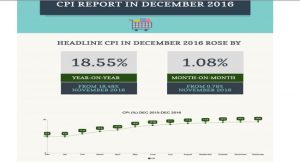
According to the statistics office, the 0.07 per cent rise from 18.48 per cent recorded in November 2016, was driven by surges in housing, water and electricity, while the food index also rose to 17.39 per cent, against 17.19 per cent.
The December 2016 report showed that Food Index rose by 17.39 percent (year-on-year) in December 2016, up by 0.20 percent points from rate recorded in November (17.19) percent.
During the month, all major food subindexes increased, with Soft Drinks recording the slowest pace of increase at 7.66 percent (year on year).
Increases were recorded in all COICOP divisions that yield the Headline Index.
Communication and Restaurants and Hotels recorded the slowest pace of growth in December, growing at 5.33 per cent and 8.91 per cent (year-on-year) respectively.
The rising inflation comes as the country grapples with its first recession in 25 years, largely caused by the fall in global oil prices since 2014.
A second quarter report of the statistics office showed Nigeria’s economy had glided into recession, with its Gross Domestic Product contracting by 2.06 per cent, but the government has continued to assure Nigerians that the recession would be short-lived.
The latest assurance on the recovery of the economy was issued by the World Bank, with its prediction that Nigeria will get out of recession and grow its Gross Domestic Product by one per cent in 2017.
In its January 2017 Global Economic Prospects report released on January 11, the global lender said that sub-saharan African growth is expected to pick up modestly to 2.9 per cent in 2017, as the region continues to adjust to lower commodity prices.

